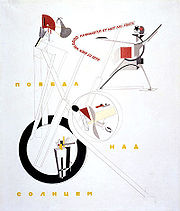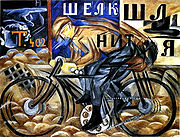
Russian Futurism
Encyclopedia

- "Russian Futurists" redirects here. For the band, see The Russian FuturistsThe Russian FuturistsThe Russian Futurists are a Canadian indie pop band based in Toronto. Their music can be described as lo-fi, indie-electronica fused with a twee-pop temperament...
.
Russian Futurism
Futurism (art)
Futurism was an artistic and social movement that originated in Italy in the early 20th century. It emphasized and glorified themes associated with contemporary concepts of the future, including speed, technology, youth and violence, and objects such as the car, the airplane and the industrial city...
is the term used to denote a group of Russian poets and artists who adopted the principles of Filippo Marinetti's "Manifesto of Futurism". Russian futurism may be said to have been initiated during December 1912, when the Moscow
Moscow
Moscow is the capital, the most populous city, and the most populous federal subject of Russia. The city is a major political, economic, cultural, scientific, religious, financial, educational, and transportation centre of Russia and the continent...
-based literary group Hylaea ( [Gileya]) (initiated during 1910 by David Burlyuk and his brothers at their estate near Kherson
Kherson
Kherson is a city in southern Ukraine. It is the administrative center of the Kherson Oblast , and is designated as its own separate raion within the oblast. Kherson is an important port on the Black Sea and Dnieper River, and the home of a major ship-building industry...
, and joined quickly by Vasily Kamensky
Vasily Kamensky
Vasily Vasilevich Kamensky was a Russian Futurist poet, playwright, and artist as well as one of the first Russian aviators.Kamensky was born in the Perm district, where his father was an inspector of goldfields...
and Velimir Khlebnikov
Velimir Khlebnikov
Velimir Khlebnikov , pseudonym of Viktor Vladimirovich Khlebnikov , was a central part of the Russian Futurist movement, but his work and influence stretch far beyond it.Khlebnikov belonged to Hylaea,...
, with Aleksey Kruchenykh and Vladimir Mayakovsky
Vladimir Mayakovsky
Vladimir Vladimirovich Mayakovsky was a Russian and Soviet poet and playwright, among the foremost representatives of early-20th century Russian Futurism.- Early life :...
joining during 1911) issued a manifesto entitled A Slap in the Face of Public Taste. Although Hylaea is generally considered to be the most influential group of Russian Futurism, other groups were formed in St. Petersburg (Igor Severyanin
Igor Severyanin
Igor Severyanin was a Russian poet who presided over the circle of the so-called Ego-Futurists.Igor was born in St. Petersburg in the family of an army engineer. Through his mother, he was remotely related to Nikolai Karamzin and Afanasy Fet. In 1904 he left for Manchuria with his father but later...
's Ego-Futurists), Moscow
Moscow
Moscow is the capital, the most populous city, and the most populous federal subject of Russia. The city is a major political, economic, cultural, scientific, religious, financial, educational, and transportation centre of Russia and the continent...
(Tsentrifuga, with Boris Pasternak
Boris Pasternak
Boris Leonidovich Pasternak was a Russian language poet, novelist, and literary translator. In his native Russia, Pasternak's anthology My Sister Life, is one of the most influential collections ever published in the Russian language...
among its members), Kiev
Kiev
Kiev or Kyiv is the capital and the largest city of Ukraine, located in the north central part of the country on the Dnieper River. The population as of the 2001 census was 2,611,300. However, higher numbers have been cited in the press....
, Kharkov, and Odessa
Odessa
Odessa or Odesa is the administrative center of the Odessa Oblast located in southern Ukraine. The city is a major seaport located on the northwest shore of the Black Sea and the fourth largest city in Ukraine with a population of 1,029,000 .The predecessor of Odessa, a small Tatar settlement,...
.
Like their Italian counterparts, the Russian Futurists were fascinated with the dynamism, speed, and restlessness of modern machines and urban life. They purposely sought to arouse controversy and to gain publicity by repudiating the static art of the past. The likes of Pushkin and Dostoevsky, according to them, should be "heaved overboard from the steamship of modernity". They acknowledged no authorities whatsoever; even Filippo Tommaso Marinetti
Filippo Tommaso Marinetti
Filippo Tommaso Emilio Marinetti was an Italian poet and editor, the founder of the Futurist movement, and a fascist ideologue.-Childhood and adolescence:...
— when he arrived in Russia on a proselytizing visit during 1914 — was obstructed by most Russian Futurists who did not profess to owe him anything.
In contrast to Marinetti's circle, Russian Futurism was primarily a literary rather than plastic philosophy. Although many poets (Mayakovsky, Burlyuk) dabbled with painting, their interests were primarily literary. However, such well-established artists as Mikhail Larionov
Mikhail Larionov
Mikhail Fyodorovich Larionov was an avant-garde Russian painter.-Life and work:...
, Natalia Goncharova
Natalia Goncharova
Natalia Sergeevna Goncharova was a Russian avant-garde artist , painter, costume designer, writer, illustrator, and set designer. Her great-aunt was Natalia Pushkina, wife of the poet Alexander Pushkin.-Life and work:...
, and Kazimir Malevich
Kazimir Malevich
Kazimir Severinovich Malevich was a Russian painter and art theoretician, born of ethnic Polish parents. He was a pioneer of geometric abstract art and the originator of the Avant-garde Suprematist movement.-Early life:...
found inspiration in the refreshing imagery of Futurist poems and experimented with versification themselves. The poets and painters collaborated on such innovative productions as the Futurist opera Victory Over the Sun
Victory over the Sun
Victory over the Sun is a Russian Futurist opera premiered in 1913 at the Luna Park in Saint Petersburg.The libretto written in zaum language was contributed by Aleksei Kruchonykh, the music was written by Mikhail Matyushin, the prologue was added by Velimir Khlebnikov, and the stage designer was...
, with music by Mikhail Matyushin
Mikhail Matyushin
Michael Vasilyevich Matyuschin was a Russian painter and composer, leading member of the Russian avant-garde. In 1910–1913 Matyushin and his wife Elena Guro were key members of the Union of the Youth, an association of Russian Futurists...
, texts by Kruchenykh and sets contributed by Malevich.
Members of Hylaea elaborated the doctrine of Cubo-Futurism
Cubo-Futurism
Cubo-Futurism was the main school of painting and sculpture practiced by the Russian Futurists.When Aristarkh Lentulov returned from Paris in 1913 and exhibited his works in Moscow, the Russian Futurist painters adopted the forms of Cubism and combined them with the Italian Futurists'...
and assumed the name of budetlyane (from the Russian word budet 'will be'). They found significance in the shape of letters, in the arrangement of text around the page, in the details of typography. They considered that there is not any substantial difference between words and material items, hence the poet should arrange words in his poems like the artist arranges colors and lines on his canvas. Grammar, syntax, and logic were often discarded; many neologisms and profane words were introduced; onomatopoeia was declared a universal texture of verse. Khlebnikov, in particular, developed "an incoherent and anarchic blend of words used without meaning for their sound alone"http://wwwa.britannica.com/eb/article-9035727, known as zaum
Zaum
Zaum is a word used to describe the linguistic experiments in sound symbolism and language creation of Russian Futurist poets such as Velimir Khlebnikov and Aleksei Kruchenykh....
.

Russian Revolution of 1917
The Russian Revolution is the collective term for a series of revolutions in Russia in 1917, which destroyed the Tsarist autocracy and led to the creation of the Soviet Union. The Tsar was deposed and replaced by a provisional government in the first revolution of February 1917...
as the end of that traditional mode of life which he and other Futurists ridiculed so zealously.
After the Bolsheviks gained power, Mayakovsky's group — patronized by Anatoly Lunacharsky, Lenin's minister of education — aspired to dominate Soviet culture. Their influence was paramount during the first years after the revolution, until their program — or rather lack thereof — was subjected to scathing criticism by the authorities. By the time OBERIU
Oberiu
OBERIU was a short-lived avant-garde collective of Russian Futurist writers, musicians, and artists in the 1920s and 1930s...
attempted to revive some of the Futurist tenets during the late 1920s, the Futurist style in Russia had already ended. The most militant Futurist poets either died (Khlebnikov, Mayakovsky) or preferred to adjust their very individual style to more conventional requirements and trends (Aseyev
Nikolay Aseyev
Nikolay Nikolaevich Aseyev, was a Russian poet.Nikolay Nikolaevich Aseyev was born in the city of Lgov in the region of Kursk. His first poetic collections, "Night Flute", written in 1914, and "Zor", written in 1914 in Russian Futurist style. He was awarded a government honor for the latter poem...
, Pasternak).

